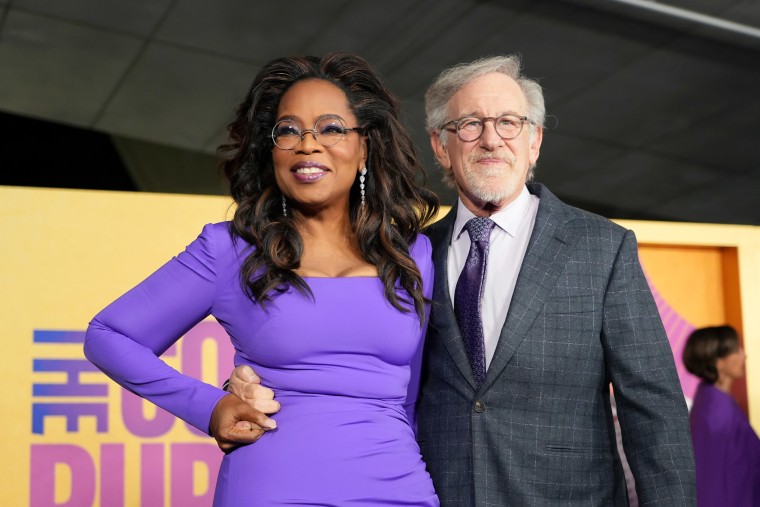[ad_1]
The classic story follows Celie, a Black woman in the South in the early 1900s who is abused physically, emotionally and sexually by her father and then by her husband. Along with themes of gender violence and intergenerational trauma, Celie’s story is one of sisterhood, bravery and self-actualization.
Starring alongside Barrino under the direction of Blitz Bazawule are Taraji P. Henson, who plays Shug Avery; Halle Bailey, as young Nettie; Danielle Brooks, who plays Sofia; Colman Domingo as Mister; and Corey Hawkins who plays Harpo.
As young Nettie, Bailey works alongside Phylicia Pearl Mpasi, who portrays young Celie, in reimagining the sister relationship that has become etched in Black culture since the 1985 film’s release. Bailey said she drew on her relationship with her own sister, singer Chloe Bailey, to perform the role.
“I really honestly was playing off of how my sister Chloe is for me and what kind of guide she’s been for me my whole life,” Bailey said of her sister. “Because Nettie is such a symbol of hope and perseverance and joy, and just that reminder that love and positivity need to be shown through us even in the darkest moments. I feel like I had a really great, I guess, guide from my sister Chloe,” she said. “And then [to be] able to play it with the beautiful Phylicia, who helped me so much, it was a really beautiful experience.”
This bond between young Nettie and Celie serves as the foundation of sisterhood that stretches throughout the story.
The 1985 adaptation of “The Color Purple,” directed by Steven Spielberg, was nominated for 11 Academy Awards, though it won none. Its release was steeped in controversy, with boycotts over its depiction of Black men and criticisms of having Spielberg handle the film instead of a Black filmmaker.
Some of that controversy has resurfaced again after the release of the first trailer of Bazawule’s movie, largely on social media and YouTube, with internet users echoing sentiments voiced nearly 40 years ago. In a 1986 Washington Post article, a Black male law professor called it “a very dangerous film,” and a Maryland NAACP official said the movie reinforced “the notion of Black men as beasts.” Demonstrators picketed the film’s premiere back then and Black celebrities such as Spike Lee condemned it for portraying Black men as “one-dimensional animals.”
Many Black women didn’t see it that way. Instead, many viewed Spielberg’s “Color Purple” as a refreshing depiction of their lived experience. One Chicago woman, Eartis Thomas, told The New York Times in 1986 that she knew many women like Celie while growing up in Mississippi, including herself, her mother and aunts, who were all abused by their husbands. Seeing a similar story unfold on screen ultimately “lifted a burden,” Thomas said.

“Black women should not be sacrificed for Black men’s pride,” she added. “Let the film roll.”
Oprah Winfrey, who played Sofia in the first film, defended the movie against its critics then. ‘’This movie is not trying to represent the history of Black people in this country any more than ‘The Godfather’ was trying to represent the history of Italian Americans. In this case, it’s one woman’s story,” she told The New York Times.
Winfrey and Spielberg are both producers of the new iteration of the film, set to debut on Christmas Day.
When Spielberg’s movie came around nearly four decades ago, some men also defended the movie, including Julian Norris, a Black Chicago Tribune writer who called it “one of the most beautiful and tender movies” he had ever seen. He added, “being a Black man, I was not upset at the depiction of Black men. I realized that the men who were portrayed in the movie did not represent all Black men.”
Now, some of the actors in Bazawule’s film say they view it as more of a healing opportunity than a vehicle to stoke gender divides. Hawkins, who plays Harpo, spoke through tears earlier this month as he recalled having his father attend the film’s Los Angeles premiere. “Our love language has evolved over the years. But to sit with him and watch him process and feel was special for me as a man, as a Black man,” he said. “I was watching him be healed by this story.”
Playwright Marsha Norman adapted “The Color Purple” into a musical for the stage in 2005, a production that received 11 Tony nominations. Its 2015 revival earned two Tony wins, one for Cynthia Erivo’s portrayal of Celie and another for best musical revival. Danielle Brooks also earned a Tony nomination for her role as Sofia in the revival.
“The Color Purple” is slated to premiere in North America on Dec. 25 and internationally beginning Jan. 18, 2024.
For more from NBC BLK, sign up for our weekly newsletter.
[ad_2]
Source link
